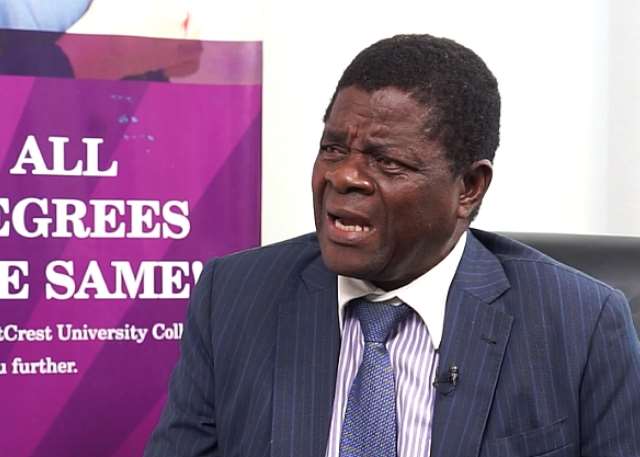The Chief Justice’s involvement in the verdict that thrashed the ruling of the Speaker of Parliament in the matter that declared four seats in Parliament vacant does not mean people cannot comment on it.
As an institution, the Supreme Court, just like any other body, can make mistakes, but should be within the constitution.
A former Director of the Ghana School of Law, Kwaku Ansa-Asare, who is making the comments, has asked Ghanaians to critique the ongoing discussion without fear of being caught for contempt as a result of the Chief Justice’s involvement.
According to Ansa-Asare, the Standing Orders of Parliament, backed by the Constitution, has guided parliamentary procedures since 1992 and there has never been an instance where the Supreme Court has been invoked to interpret a provision, saying the Speaker’s ruling is succinct.
He tells Captain Smart on Maakye, Onua TV’s morning show, that the Judiciary should stay in its lane and not interfere in matters that do not concern it.
“Since 1992, the laws have worked. No one has gone to court for interpretation. Judiciary, stay in your lane,” he said in Twi.
He said that the Supreme Court cannot gag Ghanaians for critiquing its verdict on the Speaker’s ruling, advising that State institutions should prioritise the interest of the nation in every decision they make.
“We have gone beyond being frightened. They can’t gag anyone. Since 1992 we have protected the constitution, so today, if it has come, some of us will talk. We shouldn’t say the Chief Justice was part of the panel so if we talk they will take us to court. Whatever the Supreme Court does according to Article 129(3)(4), binds everyone. But it doesn’t mean they can’t make mistakes and if they will make a mistake, it should be within the remit of the law,” he stated.
He made the comments based on the Supreme Court’s verdict on a ruling by Parliament where the Speaker declared four seats vacant.
The Supreme Court on Friday, October 18, 2024, issued a stay of execution on the ruling by Speaker Alban Bagbin declaring some four parliamentary seats vacant.
The Court also directed Parliament to recognise and allow the four MPs to fully represent their constituencies and carry out their official duties.
The applicants had initially requested for a 10-day but the Supreme Court says they should carry on with their roles as MPs until the final ruling on the matter has been delivered.
The application to stay the Speaker’s decision was filed by New Patriotic Party (NPP) Members of Parliament, who sought the Court’s intervention to halt the enforcement of the ruling that would have affected three of their colleagues and one from the National Democratic Congress (NDC).
The application was filed ex parte, meaning that neither Speaker Bagbin nor Parliament was joined to the case.
The ex parte application made the Court consider the plaintiffs’ request without seeking any response from the Speaker or other parliamentary authorities at this stage.
The case was heard by a panel of Supreme Court justices presided over by Chief Justice Gertrude Torkonoo.
Other members of the panel included Justice Mariama Owusu, Justice Kwame Adibu Asiedu, Justice Ernest Yao Gaewu, and Justice Yaw Darko Asare, who together delivered the ruling to stay the Speaker’s decision.
Representing the NPP MPs were lawyers Paa Kwesi Abaidoo and former Attorney General Joe Ghartey.
They successfully argued for the stay, which temporarily halts the Speaker’s ruling pending further legal proceedings. The Court’s decision effectively keeps the four MPs’ seats intact in the meantime.
The ruling affected three NPP MPs made up of Cynthia Morrison (Agona West), Kwadjo Asante (Suhum), and independent candidate who was doing business with the Majority, Andrew Asiamah (Fomena), and one NDC MP, Peter Yaw Kwakye Ackah (Amenfi Central), who either chose to run as independent candidates or switched party affiliations for the 2024 elections.
As a result, the NDC, previously in the Minority, now becomes a majority with 136 seats with the NPP remaining with 135 seats now assuming minority.
However, the Supreme Court’s decision on the ex parte motion reverses the ruling of the Speaker until the final ruling on the matter is delivered.












